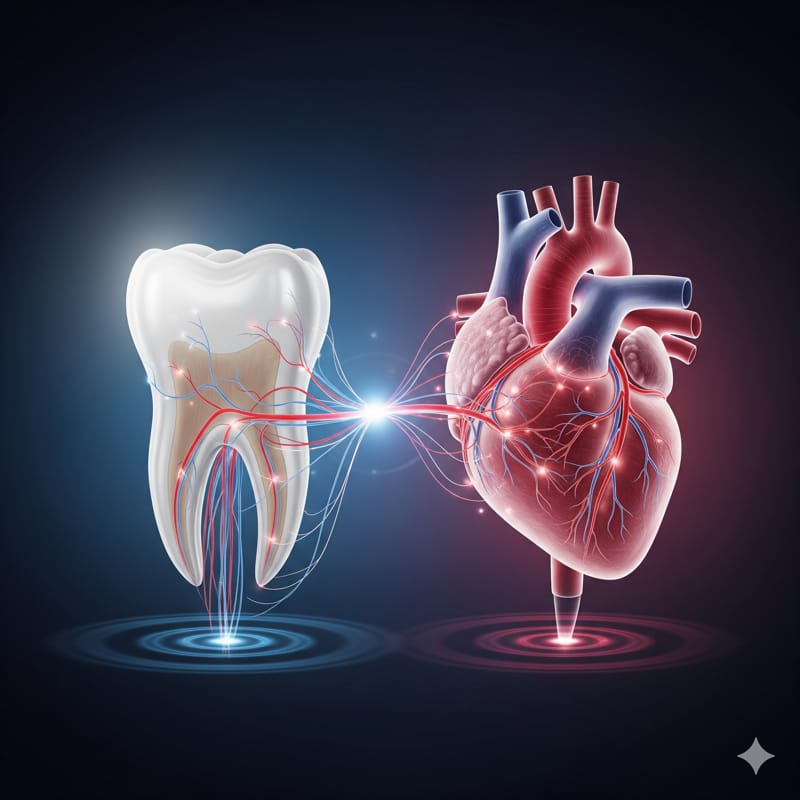Oral Health and Cardiovascular Disease: Breaking New Ground in the Mouth-Heart Connection

🔬 Landmark Clinical Trial
Intensive gum disease treatment significantly slows carotid artery thickening in otherwise healthy individuals.

A groundbreaking clinical trial published in the European Heart Journal demonstrates that intensive gum disease treatment significantly slows carotid artery thickening in otherwise healthy individuals. The London-based research, led by Dr. Marco Orlandi and Dr. Francesco D'Aiuto from University College London, shows that periodontal therapy reduces arterial thickness to levels comparable with lifestyle interventions and some pharmacological agents.
📊 The European Context
In Switzerland, periodontal conditions affect a significant portion of the population, with Switzerland ranking among the healthiest European countries alongside Spain and Sweden in terms of periodontal health. However, periodontal diseases affect 796 million people worldwide, with an age-standardised prevalence of severe periodontitis at 7.4%. In Europe, dental diseases represent the third most costly health condition at €90 billion per year, following diabetes (€119 billion) and cardiovascular diseases (€111 billion).
🔬 The Clinical Trial
The randomized controlled trial enrolled 135 participants with severe periodontitis. Using carotid ultrasound imaging, researchers measured arterial thickness at baseline. Participants received either intensive periodontal treatment (deep subgingival cleaning) or standard dental cleaning.
📈 Key Findings Over Two Years:
- Arterial Health: Significantly reduced carotid artery thickness in the treatment group
- Vascular Function: Improved blood vessel dilation
- Inflammatory Markers: Lower levels of C-reactive protein and oxidative stress markers
- Clinical Impact: "The impact of what we are doing comes without going through the classic risk pathway" for cardiovascular disease, noted Dr. Orlandi
🧬 Understanding the Biological Mechanisms
🔥 Systemic Inflammation
The chronic inflammation associated with periodontitis contributes to atherosclerosis through bacterial dissemination into systemic circulation and induction of systemic inflammatory response. Pro-inflammatory cytokines (IL-1, IL-6, TNF-α) and C-reactive protein are elevated in periodontitis patients.
🦠 Bacterial Translocation and Endocarditis
The most common culprits include:
- Viridans group streptococci: Cause almost 20% of infective endocarditis cases
- Porphyromonas gingivalis: Found in 85.75% of subgingival plaque samples from periodontitis patients
- Staphylococcus species: Major contributors to valve infections
📊 Recent Large-Scale Evidence
🇪🇺 European and Global Studies
A 2024 UK Biobank analysis of 481,915 individuals (91,022 with periodontal disease) utilizing cardiovascular magnetic resonance imaging revealed significant associations between periodontitis and cardiac structural changes. These findings underscore why regular professional cleanings by trained specialists are crucial for cardiovascular health.
💡 Therapeutic Impact
Treatment Benefits: Subgingival mechanical instrumentation in patients with both periodontitis and CVD can mitigate systemic inflammation, evidenced by reduced proinflammatory markers, improved lipid profiles, and enhanced endothelial function.
🛡️ Prevention Strategies
- Primary Prevention: Focus on improving oral hygiene and reducing gingivitis
- Antibiotic Prophylaxis: Amoxicillin prophylaxis for high-risk cardiovascular patients covers the most common oral bacteria causing infective endocarditis
- Regular Care: Professional cleanings and good oral hygiene significantly reduce cardiovascular risk
🎯 Clinical Implications
👨⚕️ For Healthcare Providers
- Integrate periodontal assessment into cardiovascular risk evaluation
- Foster collaboration between dentists and cardiologists
- Consider periodontal therapy as part of comprehensive cardiovascular prevention
👤 For Patients
- Maintain twice-daily brushing and daily interdental cleaning
- Schedule professional cleanings at least twice yearly
- Seek early treatment for gum inflammation
- Consider specialized prophylactic care from trained dental hygienists
🎯 Conclusion
The UCL trial provides robust evidence that treating gum disease can slow arterial thickening, offering a tangible cardiovascular benefit. As Dr. Maurizio Tonetti notes: "For many years, dentists have been focusing on the teeth, forgetting the rest of the body, and physicians have been focusing on the body, forgetting that there are teeth".
🚀 Take Action for Your Cardiovascular Health Today
Given the compelling evidence linking periodontal health to cardiovascular wellbeing, there has never been a more important time to prioritize professional dental care.
We are proud to announce that Sophie Baeli has recently joined our team as a specialist in orthodontics and prophylaxis. With numerous years of experience in preventive dental care, Sophie brings exceptional expertise in professional deep cleanings—exactly the type of intensive periodontal treatment shown in the UCL study to slow arterial thickening.
🎯 Sophie specializes in:
- Professional deep cleanings that target subgingival bacteria
- Personalized preventive care programs for adults and children
- Patient education on optimal oral hygiene techniques
- Regular prophylactic treatments to maintain periodontal health
Her dynamic, caring approach ensures that each session is comfortable while delivering the thorough cleaning necessary to reduce your cardiovascular risk.
Don't wait for symptoms to appear. The research is clear: professional periodontal care is a powerful tool in preventing cardiovascular disease.
Contact us now to book your professional cleaning and cardiovascular health consultation at Clinique Dentaire de Dorigny.
